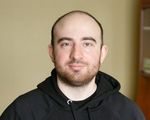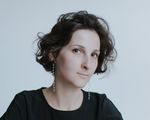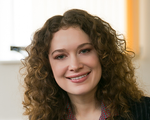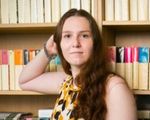About Success Builder
How do you find your place in life? How do you find something to do that both comes naturally to you and makes you happy? The answer is that you have to apply the knowledge you’ve gained from university and from life itself correctly. The Success Builder Project features HSE University graduates who have discovered themselves through an interesting business or an unexpected profession. The protagonists share their experiences and lessons learnt and talk about how they’ve made the most of the opportunities they were given.
Starting your own business is usually a good thing, but it’s very scary, especially for someone with an honours diploma and a promising future in finance. Ekaterina Frolova, an ICEF alumna and the founder of CitYkids, a chain of children's centres, tells Success Builder why she forewent a career as a bank clerk to work with children, how to provide young moms with leisure time, and what motivates happy people.
How did it come about that after receiving an honours diploma from HSE, you started working with babies?
At a certain stage in their careers, the majority of women drop everything to have a baby, which isn’t surprising for anyone. The only difference is that I work with other people's babies. Really, I always wanted to work with children. My mother is a paediatrician, which is what I always wanted to be growing up, but my mom talked me out of it.
When I was making a final decision on whether or not to find a job at a bank, I knew that all of ICEF was already working in offices. Getting a job in your field is easy after graduating from HSE.
I went to HSE's ICEF because I think it's necessary to have basic management and economics skills in any job, especially those related to entrepreneurship. I was personally drawn to having my own business, that is CitYkids, because it not only allows you to work with children, but it is also a way to do a lot of different things at the same time, like manage a team and develop a business the way I think it should be developed. The majority of my classmates work in consulting or at banks, but this doesn’t give you the opportunity to learn new things the way entrepreneurship does. Entrepreneurship is, of course, always a risk. Many people say that they work in consulting for a few years before starting their own projects, but I decided to do things differently. I was able to hedge my risks by partnering with two incredible girls who are older and more experienced than I am.

How do you complement one another and what are your functions in the project?
The girls have valuable hands-on experience. I don’t have any children yet, but they have four altogether, and one of them holds the title of Best Mother of Moscow and has written different articles on motherhood and childhood education. We opened our first centre in Bauman Garden in 2013, and we opened another two last year – one in the southwest of Moscow on Akademika Pilyugina Street and the other just outside of Moscow. We try to share responsibilities equally. I handle marketing, work with partners, develop the centre on Akademika Pilyugina, and hire personnel. We have around 50 employees at the three centres.
Are these your direct duties?
The company is not very large, so I can’t really say anything about a clearly formed structure of responsibilities. We have staff with a specific set of duties, but people often end up rolling up their sleeves and doing a lot of different things independently. For example, at last year’s Start Up Festival for preschool education at Moscow’s Central House of Artists, I had to bring all the materials myself to decorate our stand, organise round tables, etc. But my efforts paid off – we won the prize for Best Location of 2014.
The main thing with our work is the connection between effort and results. You might change something and improve it today, but you see progress tomorrow in increased revenues or just the smile on children’s faces.
What professional skills help resolve management issues?
I of course don’t need any insane financial formulas in my work, but having a working knowledge of budgets and accounting helps a lot. ICEF taught me how to get things done on time, which is crucial for an entrepreneur. HSE students are ambitious, driven, active, and organized. They are able to do well in school, participate in sports, and express their creativity. This is how we live now as well.
Why did you nonetheless decide against a career in banking, given your academic achievements and active participation in university life?
The majority of my classmates go into banking and consulting. When I was making a final decision on whether or not to find a job at a bank, I knew that all of ICEF was already working in offices. Getting a job in your field is easy after graduating from HSE. But how can you find motivation if it’s hard to see your contribution to the whole? And if you’re just a small part of a big corporation, then you’re not used to sensing your own value and use, while this is the very thing that motivates the majority of happy people. I need to do my own thing to feel my own personal fulfilment. Having your own business is a daily source of motivation. Of course, many graduates are frightened of this, however. Starting is the scary part.
5–10 thousand roubles
is how much parents are willing to spend on their child's development each month out of their 30,000-40,000 rouble salaries
Source: CitYkids

What makes your business competitive on the children’s services market?
The children’s services market is in a phase of growth, as many private kindergartens, centres, and studios are opening up. CitYkids is different because it has programmes for new-borns and carries out events for the entire family. This is why we are positioning ourselves as ‘family centres’ with creativity, music, dance, art therapy, meetings for fathers, and bachelorette parties. On weekends, we also have family concerts and plays. Just a few years ago, Moscow didn’t have a single location that a young mother could take her new-born to. We dreamed of our centres being a place for mothers and fathers, a place where they could learn to ‘enjoy’ being a parent. We have everything for this – playrooms with playpens and rocking chairs, changing tables, soft beanbag chairs for naptime, free diapers, everything for feeding, and much more. But this is daily life. The most important thing is that we use the unique British method for early development called Baby Sensory, which has proven successful in 27 countries around the world, including the U.S., United Arab Emirates, China, European countries, and others. It is built around sensory development starting from birth and has been used with babies as young as three days old, a record. We have had parents bring in their ten-day old babies as well. We have fully adapted and translated the methodology into Russian, including musical materials. In a typical class, mothers bring their children to group lessons, and everything is accompanied by music, scents, and tactile sensations. This is fun for not only the child, but the mother as well, as everything is aimed at high-quality amusement focused on the baby’s all-around development.
Word of mouth works best in our business. Analysis has confirmed that when asked where they heard about us, people always respond: from friends.
What are the advantages of the Baby Sensory method?
A baby’s brain doubles in its first year, as this is when all key neuron connections are built. This is why it is so important to stimulate a child’s mind using various impulses: sound, light, taste, smell, etc. Baby Sensory includes more than 100 different colourful activities aimed at developing babies’ senses, which is so important in their first year. The methodology is also good because of its versatility. All classes and lesson plans are clearly outlined, and even if an instructor is sick, the learning process goes uninterrupted. Baby Sensory instructors study in London, and I went through an intensive training myself, after which you are monitored to see how you conduct lessons. Lesson plans are observed right up to how games and props are placed for each activity. We also brought equipment sets from England that are produced specifically for the Baby Sensory method.
Are mothers quick to trust this new method?
We are the first in Russia, so the Baby Sensory method is not yet known to all of our moms and isn’t as popular as the well-known Montessori Method. But it’s not hard to convince people of Baby Sensory’s benefits after seeing it in action. The methodology is rapidly gaining popularity in Russia, and we are selling franchises so that other entrepreneurs can create locations for these methods. We sold two franchises in Moscow in a matter of a few months, and the Baby Sensory method might arise in other cities around Russia as well.

And what do you do about so-called ‘mobile mothers,’ who go back to work just a few weeks after having a baby?
From the very beginning, we thought about developing both a family-focused business direction and a corporate-focused one. The corporate division is still being developed, and we are in talks with a number of large companies such as Philips, Unilever, SAP, and others. Corporations in Europe always have children’s rooms and kindergartens for employees’ kids, and we want to bring this setup to Russia as well.
How do you attract clients to your centres?
We market locally using forums and websites for moms. We also talk to journalists, participate in exhibitions and forums, and go to parks in the summer. In 2012, for instance, we held the festival Family in the City at Bauman Garden. But despite all of these efforts, word of mouth works best in our business. Analysis has confirmed that when asked where they heard about us, people always respond: from friends.
At HSE you worked closely with the charity ICEF Outreach. Are you able to find time for charity work now?
At ICEF Outreach, I talked a lot with kids from orphanages, and aside from social work I realized I had a need to work and communicate with children. I am now able to fulfill my love for kids through CitYkids as well. I’m also in ongoing contact with several kids from orphanages and with the heads of charitable organizations.














































































































































